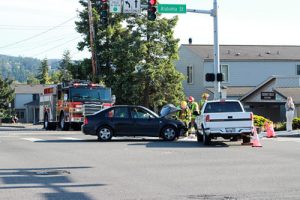Why Uninsured/Underinsured Motorist Coverage Matters – And Why You Shouldn’t Settle Without Legal Advice
You’re drivi ng home to Virginia after a relaxing vacation at the Jersey Shore. Traffic on I-95 slows to a crawl as you approach Philadelphia. Suddenly, a chain reaction crash unfolds in front of you. You’re struck, your car is totaled, and you feel sharp pain in your neck. The at-fault driver? Intoxicated—and carrying far too little insurance to cover your injuries, medical bills, lost wages, and property damage.
ng home to Virginia after a relaxing vacation at the Jersey Shore. Traffic on I-95 slows to a crawl as you approach Philadelphia. Suddenly, a chain reaction crash unfolds in front of you. You’re struck, your car is totaled, and you feel sharp pain in your neck. The at-fault driver? Intoxicated—and carrying far too little insurance to cover your injuries, medical bills, lost wages, and property damage.
This is not just a hypothetical. Our firm recently represented a client in almost this exact situation. The accident happened in Pennsylvania, but our client’s Virginia underinsured motorist (UIM) coverage ultimately made all the difference. Working alongside a Pennsylvania attorney, we navigated both states’ laws to ensure the claim was handled correctly. The result: a good settlement that provided compensation for our client’s injuries, financial losses, and pain and suffering.
What Is Uninsured/Underinsured Motorist Coverage?
Uninsured motorist (UM) coverage protects you when you’re hit by a driver who has no insurance. Underinsured motorist (UIM) coverage steps in when the other driver’s insurance isn’t enough to pay for your damages. Both coverages can pay for:
- Medical expenses
- Lost wages
- Pain and suffering
- Vehicle repair or replacement
Even when another driver carries some insurance, it can be quickly exhausted in a serious crash—especially if multiple vehicles or serious injuries are involved. Without UM/UIM coverage, you could be left paying the difference yourself.
Virginia’s UM/UIM Requirements
Virginia law now requires every registered vehicle to carry liability insurance, and your policy must include UM coverage up to equal but not exceeding to your liability limits. As of January 1, 2025, the state minimums are:
- Bodily Injury: $50,000 per person / $100,000 per accident
- Property Damage: $25,000 per accident
- UM/UIM Bodily Injury: $50,000 per person / $100,000 per accident
- UM/UIM Property Damage: $25,000 per accident
These are just minimums. In a severe accident, those limits may not come close to covering your total losses. Increasing your UM/UIM limits is one of the most affordable ways to protect yourself financially.
Don’t Accept an Insurance Offer Without Legal Guidance
After an accident, the at-fault driver’s insurance company—or even your own—may offer you a settlement quickly. But insurance companies are not on your side. Their priority is to settle for as little as possible, and once you accept their offer, you can’t go back for more—even if you later discover your injuries are more serious or your losses greater than you realized.
Our recent case is a perfect example: without legal guidance, our client might have accepted an offer that didn’t come close to covering the true costs of his injuries and recovery. By consulting an experienced law firm, he received the full benefit of his UM/UIM coverage and a settlement that reflected the real impact of the accident.
Bottom Line
If you’re injured by an uninsured or underinsured driver—whether in Virginia or out of state—your own UM/UIM coverage may be the key to fair compensation. But don’t leave it to the insurance company to decide what your case is worth. Talk to an experienced personal injury firm like ours before signing anything. Your recovery, both physical and financial, may depend on it.
 Virginia Injury Lawyer Blog
Virginia Injury Lawyer Blog

